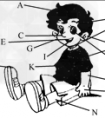单词拼写。1. You can _______ _______ (打电话给) Michael if you get to Fuzhou. He will meet you. 2. I think bad _______ (环境) can make people much stronger.-八年级英语
(Cleaning the windows is your task.)
What I hate most is being laughed at. 我最痛恨的就是被别人嘲笑。
(Being laughed at is what I hate most.)
四、动名词作定语
动名词作定语往往表示被修饰词的某种用途。如:
a walking stick =a stick for walking=a stick which is used for walking
a washing machine=a machine for washing=a machine which is used for washing
a reading room=a room for reading=a room which is used for reading
a measuring tape=a tape for measuring=a tape which is used for measuring
sleeping pills=pills for sleeping=pills which is used for sleeping
动名词也有时态和语态的变化,如表所示(以及物动词write为例),不及物动词没有语态的变化。
| 时态、语态 | 主动 | 被动 |
| 一般式 | writing | being written |
| 完成式 having written |
having been written |
1) 动名词做主语时,谓语动词为单数
2) 在动名词和不定式中,作为介词的宾语是动名词
3) 动名词的否定直接在其前加否定词,通过代词的宾格或所有格形式给出逻辑主语
例:I would appreciate you calling back this afternoon.
4) 有些词后只能接动名词
acknowledge;admit; advise;advocate;allow;appreciate; avoid; celebrate; consider; contemplate; defer; delay; deny;
detest; discontinue; dislike; dispute; enjoy; it entails; escape; excuse; explain; fancy; feel like; finish; forgive; can’t help;
hinder; imagine; it involves; keep; it means; mention; mind; miss; it necessitates; pardon; postpone; practice; prevent;
recall; report; resent; resist; risk; suggest; understand...
5) 另外还有一些接-ing形式的常用说法
it’s no good; it’s no/little/hardly any/ use; it’s not/hardly/scarcely use; it’s worthwhile; spend money/time; there’s no;
there’s no point in; there’s nothing worse than; what’s the use/point
6) 有些词后面加不定式和动名词均可
remember,forget,try,stop,go on,continue,stop,regret,cease,mean后面均可用不定式和-ing形式,但意义截然不容。
例:remember to do/doing:
①I remembered to post the letters.(指未来/过去未来将要做的动作)
②I remembered posting/having posted the letters.(我记得做过这个动作)
forget与remember的用法类似。
regret的用法:
①I regret to inform you that…(我很遗憾地通知你……)
②I regretted having left the firm after twenty years.(为了“二十年前的离开”而遗憾。)
try to(努力)与try +–ing(试验):
①You really must try to overcome your shyness.
②Try practicing five hours a day.
考点名称:介词
- 介词:
是一种用来表示词与词、词与句之间的关系的虚词,在句中不能单独作句子成分。
介词后面一般有名词代词或相当于名词的其他词类,短语或从句作它的宾语。 - 介词的分类:
(1)表示时间,处所:从 自 自从 于 打 到 往 在 当 朝 向 顺着 沿着 随着
(2)表示方式:按 照 按照 依 依照 本着 经过 通过 根据 以 凭
(3)表示目的:为 为了 为着
(4)表示原因:因 由于 因为
(5)表示对象,范围:对 对于 把 向 跟 与 同 给 关于
(6)表示排除:除 除了 除去 除非
(7)表示被动:被 叫 让 给
(8)表示比较:比 和 同
上述介词中的“着,了,过”是语素,不是动态助词。 介词at, in, on的区别:
1. 表示时间,注意以下用法:
(1) 表示时间的某一点、某一时刻或年龄等用 at。如:
I get up at six in the morning. 我早上六点钟起床。
He got married at the age of 25. 他 25 岁结婚。
(2) 泛指一般意义的上午、下午或晚上以及月或年等较长的时间,一般用 in。如:
We watch TV in the evening. 我们晚上看电视。
He went to Japan in 1946. 他于 1946 去了日本。
(3) 若表示星期几或某一特定的日期,则用 on。如:
He left here on the fifth of May. 他于 5 月 5 日离开这儿。
2. 表示地点、场所、位置等,注意以下用法:
(1) 表示某一点位置,用 at。如:
We live at No 87 Beijing Road. 我们住在北京路 87 号。
The hospital is at the end of the street. 医院在这条街的尽头。
与名词所有格连用表示地点,也用 at。如:
at my sister’s 在我姐姐家 at the doctor’s 在医务室
(2) 表示空间或范围,用 in。如:
What’s in the box? 这盒子里有什么?
He lives in Paris with his wife. 他同他妻子住在巴黎。
但有时两者可换用。如:
The meeting was held at [in] the hotel. 会议在宾馆举行。
(3) at 与 in 的另一个区别是:at 用于指较小的地方,而 in 用于指较大的地方。如:
in Shanghai 在上海 at the station 在车站
但是,大与小是相对的,有时随着说话者的着眼点不同,大地方也可能用 at(比如把一个大地方看作一个点时)。如:
Our plane refuelled at London. 我们的飞机在伦敦加油。
We stopped for an hour at Moscow on our way to Paris. 我们在去巴黎的途中在莫斯科停了 1 个小时。
(4) 介词 on 用于地点,主要指在某物的表面。如:
What’s on the table? 桌上有什么?
There’s a wallet lying on the ground. 地上有个钱包。
注:在少数搭配中,也用介词 on。如:
He works on a farm. 他在农场工作。
3. 在某些搭配中,三者的区别与英国英语和美国英语有关:
in the street (英) / on the street (美) 在街上
in the road (英) / on the road (美) 在路上
in the team (英) / on the team (美) 在这个队
at the weekend (英) / on the weekend (美) 在周末
at weekends (英) / on weekends (美) 在周末
4. 有时三者的差别与搭配习惯和用法有关:
in bed / on the bed 在床上
in the tree (多指树外之物) / on the tree (多指树本身之物) 在树上介词besides,but,except的用法区别:
1. 三者都可表示“除外”,但 besides 表示一种累加关系,意指“除了什么之外,还有……”;
而 except 或 but 则表示一种排除关系,意指“除了什么之外,不再有……”。如:
Besides his wife,his daughter also went to see him. 除他妻子外,他女儿也去看过他(即妻子女儿都去看过他)。
Nobody went to see him except [but] his wife. 除他妻子外,没有一个人看过他(即只有他妻子去看过他)。
注:在否定句中,besides 也表示“除……之外不再有…… ”,与but, except 同义。如:
No one passed the exam besides [except] Jim. 除吉姆外,没一个人通过考试。
2. 关于 but 与 except:
(1) 两者都可表示“除……外不再有……”,但含义上略有差别:
but侧重指意义的几乎完整性,而 except 则侧重指后面除去的部分。比较:
All are here but one. 除一个人都到了。
All are here except one. 还有一个人没到。
(2) 在现代英语中,but 的介词用法十分有限,一般说来,它只能用在下列词语之后:
① no, no one, nobody, nothing, nowhere 等
② any, anyone, anybody, anything, anywhere 等
③ every, everyone, everybody, everything, everywhere 等
④ all, none 等
⑤ who, what, where 等
Everyone knows it but you. 除你之外大家都知道。
I haven’t told anybody but you. 除你之外,我没告诉任何人。
No one but he [him] showed much interest in it. 除他之外没有一个人对此有很大兴趣。
一般说来,若没有出现上述词汇,就不宜使用介词 but,否则可能造成错句。但是 except 却没有以上限制。比较:
正:The window is never opened except in summer. 除夏天外,这扇窗户从不打开。
误:The window is never opened but in summer.
(3) but 一定不能用于句首,except 通常不用于句首:
除我之外每个人都累了。
正:Everyone is tired but (except) me.
正:Everyone but (except) me is tired.
误:But (Except) me, everyone is tired.
注:except for 可用于句首,表示 except 的意思:
正:Except for me, everyone is tired.
3. 关于 except 与 except for:
except 主要用来谈论同类的东西,而 except for 则主要用来谈论不同类的东西,有时含有惋惜之意。如:
- 最新内容
- 相关内容
- 网友推荐
- 图文推荐
| [家长教育] 孩子为什么会和父母感情疏离? (2019-07-14) |
| [教师分享] 给远方姐姐的一封信 (2018-11-07) |
| [教师分享] 伸缩门 (2018-11-07) |
| [教师分享] 回家乡 (2018-11-07) |
| [教师分享] 是风味也是人间 (2018-11-07) |
| [教师分享] 一句格言的启示 (2018-11-07) |
| [教师分享] 无规矩不成方圆 (2018-11-07) |
| [教师分享] 第十届全国教育名家论坛有感(二) (2018-11-07) |
| [教师分享] 贪玩的小狗 (2018-11-07) |
| [教师分享] 未命名文章 (2018-11-07) |






